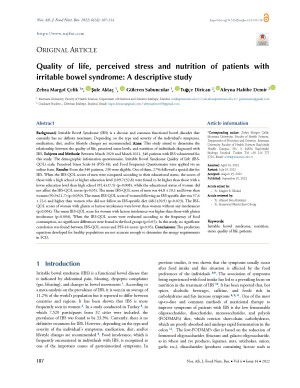Quality of life, perceived stress and nutrition of patients with irritable bowel syndrome: A descriptive study
Abstract
Background: Irritable Bowel Syndrome (IBS) is a chronic and common functional bowel disorder that currently has no definite treatment. Depending on the type and severity of the individual's symptoms, medication, diet, and/or lifestyle changes are recommended. Aims: This study aimed to determine the relationship between the quality of life, perceived stress levels, and nutrition of individuals diagnosed with IBS. Subjects and Methods: Between March 2020 and March 2021, 340 patients with IBS volunteered for this study. The demographic information questionnaire, Irritable Bowel Syndrome Quality of Life (IBS-QOL) scale, Perceived Stress Scale-14 (PSS-14), and Food Frequency Questionnaire were applied via an online form. Results: From the 340 patients, 230 were eligible. Out of them, 27% followed a special diet for IBS. When the IBS-QOL scores of men were compared according to their educational status, the scores of those with a high school or higher education level (109.7±32.8) were found to be higher than those with a lower education level than high school (95.4±17.5) (p=0.008), while the educational status of women did not affect the IBS-QOL scores (p>0.05). The mean IBS-QOL score of men was 44.8 ± 20.1 and lower than women (50.9±21.7) (p=0.030). The mean IBS-QOL score of women following an IBS-specific diet was 57.6 ± 22.6 and higher than women who did not follow an IBS-specific diet (48.2±20.9) (p=0.023). The IBS-QOL scores of women with gluten or lactose intolerance were lower than women without any intolerances (p=0.004). The mean IBS-QOL score for women with lactose intolerance was higher than those with gluten intolerance (p=0.004). When the IBS-QOL scores were evaluated according to the frequency of food consumption, no significant differences were found in the food groups (p>0.05). In this study, no significant correlation was found between IBS-QOL scores and PSS-14 scores (p>0.05). Conclusions: The prediction equations developed for healthy populations are not accurate enough to determine the energy requirements in SCD.
Full text article
Authors
Copyright (c) 2022 Zehra Margot Çelik, Şule Aktaç, Güleren Sabuncular, Tuğçe Dirican, Aleyna Habibe Demir

This work is licensed under a Creative Commons Attribution 4.0 International License.
-
Attribution — You must give appropriate credit, provide a link to the license, and indicate if changes were made. You may do so in any reasonable manner, but not in any way that suggests the licensor endorses you or your use.
-
No additional restrictions — You may not apply legal terms or technological measures that legally restrict others from doing anything the license permits.





